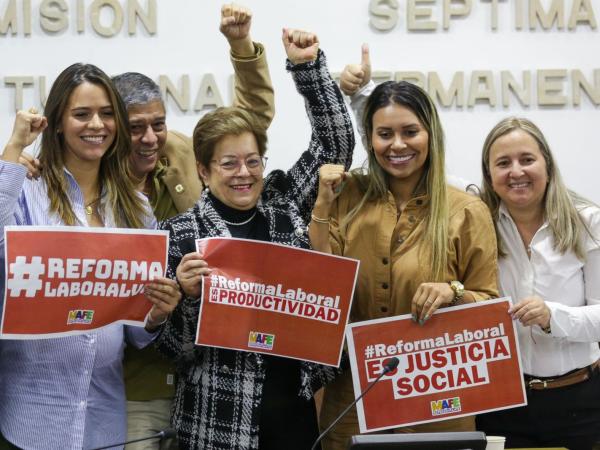When everything seemed ready for the labor reform to begin the final stretch in the Legislature, in search of the three approvals that are needed to become law of the Republic, new challenges would be emerging on the horizon for this initiative, a priority of the Ministry of Labor and that Now he would be left without the necessary support in the midst of the race against time that he is engaged in.
Although at one point it was thought that there was an agreement between the different political sectors, in which the tripartite Commission was not taken into account, said unity could be in danger, after a party very close to the National Government announced that there are several points of the reform that They do not fully convince him, some on points classified as vital for President Petro.
This is the Liberal Party, a group led by former President César Gaviria, which in the last few hours issued a statement in which it expressed its objections to several points of the project, whose discussions are expected to begin next week, a situation that led them to meet recently to take action on the matter.
For reading: Budget 2025: Discussions advance amid requests for confidence and certainties
“The Colombian Liberal Party has been a historical defender of labor causes, leading and promoting actions for the development and progress of Colombia. Our decisions have always sought the consolidation of a competitive economy that generates employment, innovation and growth, while guaranteeing labor rights and the well-being of Colombian workers,” they began by saying.
Gustavo Petro during the presentation of the labor reform in Congress.
PHOTO: Ministry of Labor Press
In this regard, they explained that, in order to resolve the concerns they have, said meeting was held on August 21, 2024, and there they also discussed the position they will take regarding the reform project that was ready for debate in the plenary session of the Chamber and will later go to the Senate.
“At this meeting, some issues that generate concern within the reform project were established. Issues such as the Compensation System for dismissal without just cause, Paternity Leave, the Maximum Legal Working Day and The Learning Contract, among others, must be studied in depth,” the statement says.
In this regard, the Liberal Party in the House added that “for this purpose, the creation of a Special Study Commission has been decided, where the article will be addressed in a comprehensive manner and where the proposals and boundaries that will be defended by the Party during the debate will be established.”
You may be interested in: Shakeup? Text of resignation of 2 members of Ecopetrol’s board of directors was released
The congressmen closed by saying that “the country demands concerted solutions that will improve the quality of life of Colombian workers, their sources of employment and thus contribute to overcoming structural problems in Colombian society.”

Cesar Gaviria, director of the Colombian Liberal Party and president of Colombia between 1990 and 1994.
Claudia Rubio / THE TIME
This message has been interpreted by some sectors as a possible distancing on the part of the liberals, who during the last months have been allies of the National Government, but who seem to have objections on this occasion that they will review as a team to determine what their next step will be.
A blow to informality
A recent chapter in the debates on labor reform had to do with a report entitled “On the interface between Social Security and fiscal cost”, written by researchers Cristina Fernández and Gabriel Ulyssea, which argues that the labour reform being carried out by the Government could have an impact on informality.
“According to our estimates, the reform proposed by the government could generate a considerable increase in informality (from 7 to 12 percentage points), concentrated mainly among workers with completed secondary education,” the article says.
Other news: Dollar extends gains on Wednesday and strengthens above $4,000
These experts added that “the wages of qualified informal workers would decrease (from 12 to 25 percentage points), which would have positive impacts on already informal companies and could encourage companies formal to become informal, as well as a greater entry of small businesses into the informal sector.”
They also warn that productivity would decline, although output could rise due to the increase in the number of companies. From a fiscal point of view, tax revenues are expected to decrease between 1.8 and 2 percentage points, depending on the scenario, which is far from the zero fiscal impact claimed by the Government.

Informality
Jaime Moreno / Portfolio
“In short, the fact that the 2002 reform has not had a significant impact in informality and employment does not imply that the opposite will happen with a reform that reverses it. The reason is that, in the presence of minimum wages, the impacts are not symmetrical,” they concluded.
In this regard, they suggest that it is necessary to increase oversight in the broad margin of informality or reduce taxes are among the policies with the greatest positive impacts, since from a fiscal point of view, eliminating entry costs to the formal sector, increasing oversight or eliminating the tax-exempt section may be more appropriate.
If nothing changes on the agenda, the votes in plenary on the labor reform are expected to take place after September 15, with the request for speed made by the Ministry of Labor, since the initiative has until December to achieve full approval or it will fail again in the Legislature.

















